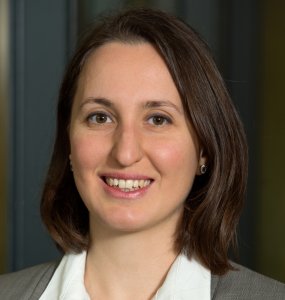Presented By: Aerospace Engineering
Aerospace Engineering Department Seminar: A Formal Methods Approach for Dynamical Systems to Learn Complex Behaviors

Derya Aksaray
Assistant Professor
Department of Aerospace Engineering and Mechanics
University of Minnesota
Dynamical systems such as drones, mobile robots, or driverless cars are envisioned to achieve complex specifications which may include spatial (e.g., regions of interest), temporal (e.g., time bounds), and logical (e.g., priority, dependency, concurrency among tasks) requirements. As specifications get more complex, representing them via algebraic equations gets harder. Alternatively, such specifications can be compactly expressed using temporal logics (TL). In this talk, I will address the problem of learning optimal control policies for satisfying TL specifications in the face of uncertainty. Standard reinforcement learning algorithms are not directly applicable when the objective is to satisfy a TL specification. To overcome this limitation, I will formulate an approximate problem that can be solved via reinforcement learning and present the suboptimality bound of the proposed solution. Then, I will consider a TL specification as a hard constraint in the learning problem and present a novel approach to reinforcement learning with guaranteed constraint satisfaction. I will motivate this part by multi-use of autonomous systems, e.g., a drone executing a pick-up and delivery mission as the primary-task while learning to fly over critical regions as the secondary-task. Finally, I will conclude my talk by discussing some future directions in resilient and safe autonomy.
About the speaker...
Derya Aksaray is currently an Assistant Professor in the Department of Aerospace Engineering and Mechanics at the University of Minnesota (UMN). Before joining UMN, she held post-doctoral researcher positions at the Massachusetts Institute of Technology from 2016-2017 and at Boston University from 2014-2016. She received her Ph.D. degree in Aerospace Engineering from the Georgia Institute of Technology in 2014. Her research interests lie primarily in the areas of control theory, formal methods, and machine learning with applications to autonomous systems and aerial robotics.
Assistant Professor
Department of Aerospace Engineering and Mechanics
University of Minnesota
Dynamical systems such as drones, mobile robots, or driverless cars are envisioned to achieve complex specifications which may include spatial (e.g., regions of interest), temporal (e.g., time bounds), and logical (e.g., priority, dependency, concurrency among tasks) requirements. As specifications get more complex, representing them via algebraic equations gets harder. Alternatively, such specifications can be compactly expressed using temporal logics (TL). In this talk, I will address the problem of learning optimal control policies for satisfying TL specifications in the face of uncertainty. Standard reinforcement learning algorithms are not directly applicable when the objective is to satisfy a TL specification. To overcome this limitation, I will formulate an approximate problem that can be solved via reinforcement learning and present the suboptimality bound of the proposed solution. Then, I will consider a TL specification as a hard constraint in the learning problem and present a novel approach to reinforcement learning with guaranteed constraint satisfaction. I will motivate this part by multi-use of autonomous systems, e.g., a drone executing a pick-up and delivery mission as the primary-task while learning to fly over critical regions as the secondary-task. Finally, I will conclude my talk by discussing some future directions in resilient and safe autonomy.
About the speaker...
Derya Aksaray is currently an Assistant Professor in the Department of Aerospace Engineering and Mechanics at the University of Minnesota (UMN). Before joining UMN, she held post-doctoral researcher positions at the Massachusetts Institute of Technology from 2016-2017 and at Boston University from 2014-2016. She received her Ph.D. degree in Aerospace Engineering from the Georgia Institute of Technology in 2014. Her research interests lie primarily in the areas of control theory, formal methods, and machine learning with applications to autonomous systems and aerial robotics.